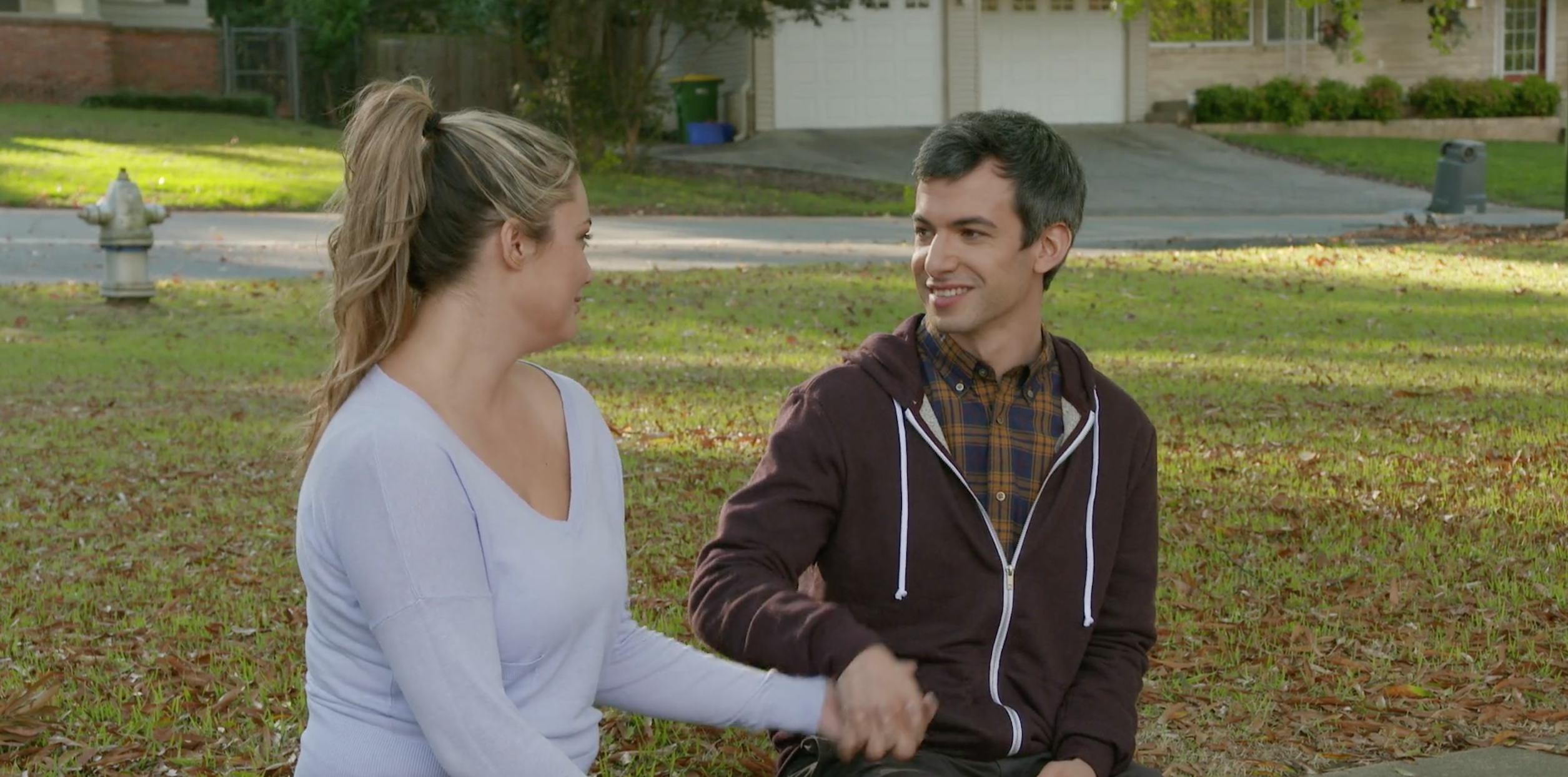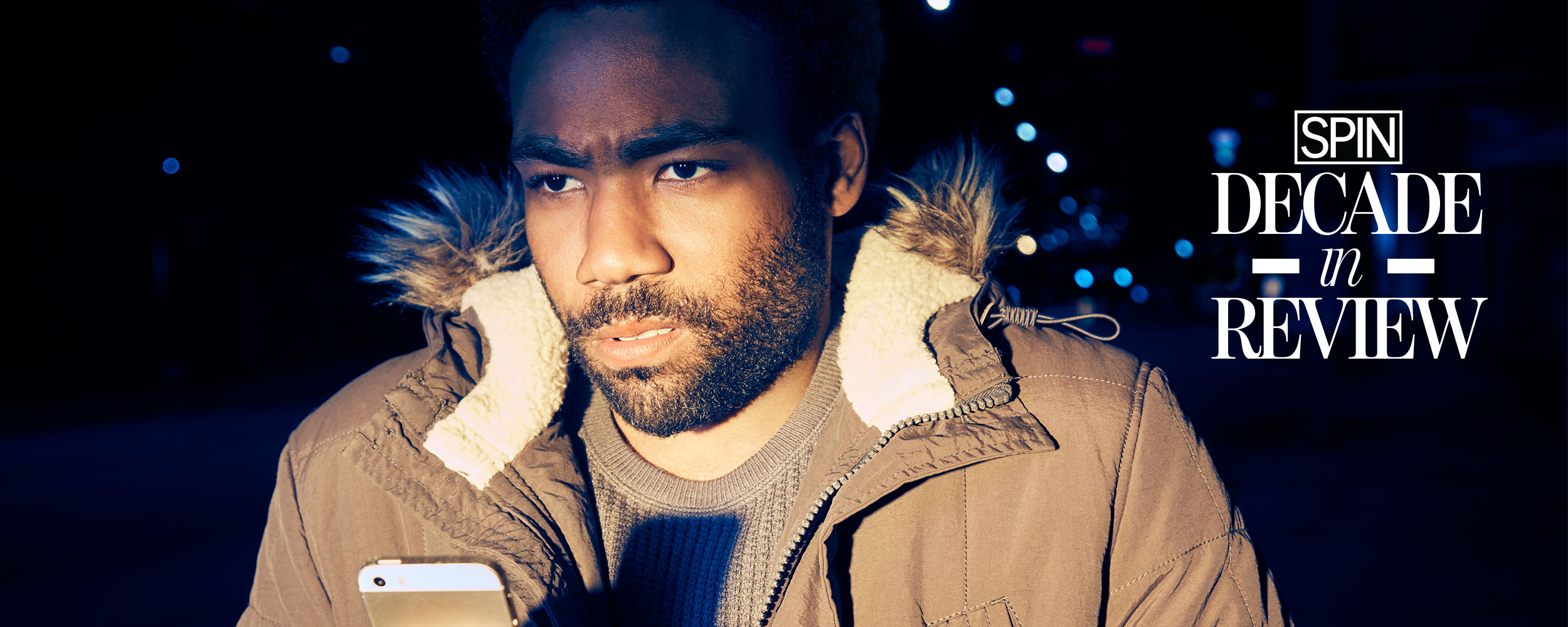During the two-hour season finale of Nathan For You, which aired earlier this month, Nathan Fielder finds himself somewhere in Arkansas, out on a “date” with an escort named Maci. They’re holding hands, developing a more and more ambiguous relationship, after meeting for ends related to Nathan’s show. “The more we kept shooting things, the harder it was to tell where the show ended and life began,” Nathan says in a voiceover. On screen, Nathan professes to “like” her. And of course, she responds in kind—he paid her $350 to hang out for an hour. But the lines here are intensely blurred: Where do the business and the personal converge? What ethics apply to a technically illegal transaction that may or may not become something more? Is Maci actually developing feelings? Is Nathan acting? Is Nathan—who routinely forgoes typical human reactions for the sake of the show—even capable of feeling something, on camera or off? He seems just as confused as we do. That perpetual turn of the screw, leaving us mulling every possible scenario, keeps us fascinated. One gets the sense Nathan wants to leave us hanging.
Over its four seasons, Nathan has gone from Comedy Central cult reality-show send up, to widely revered labyrinthine documentary, with a through-line of immense heart. Starting from a premise of helping businesses get traction through publicity stunts and media manipulation, Nathan has managed to critique the absurdity and facility of our culture from top to bottom: commerce, art, music, media, industry, heroics, romance, and television itself. Often deceiving his subjects (and viewers) by obfuscating just exactly how the intricate plans will coalesce, he still manages to give everyone what they want: the business gets its promotion; Nathan gets its show; and the sadomasochist viewer gets some kind of release. It is what appears to be an art performance, in a way that could only be propelled by someone who truly perceives the gross id of the American consumer, presented in a way that makes us part and parcel to the joke. These backhanded critiques act as a mirror. It can be painful to watch, like revisiting a deactivated social media account alongside a corresponding credit card transaction history—you are forced to reckon with just how ungainly it is to simply be alive in this culture. It’s Bar Rescue meets Fishing With John.
The concluding episode of Nathan For You (season 4) is unfathomably great. (Now, I'm going to business school.)
— errolmorris (@errolmorris) November 13, 2017

Also Read
30 Great TV Shows That Defined the 2010s
Nathan, who usually shoots his show from Los Angeles, was in the South to help Bill Heath—a struggling actor and a bit player in one of his many capers—find a long-lost love he hadn’t seen in some 50 years. Nathan and Bill travel to rural Arkansas to track down Frances Gaddy. In the process, they pose as movie producers in order to heist a 1957 yearbook; they hire a dubious age-progression specialist to create an image that looks like a fucked-up Chuck Close painting; they throw a fake class reunion to dupe Gaddy’s classmates into divulging information about her; they hire Maci to give Bill practice on a date; they hire an actress to role-play the impending meeting between Bill and Frances; and they finally track her down in Michigan, where Bill can’t bring himself to walk up Frances’s driveway after speaking to her on the phone. She’s long moved on with her life. And after more than 50 years lamenting his mistakes, going to Hollywood to chase what he thought was his dream, Bill finally realizes, just yards from his long-lost love, that he has to move on. The regret is palpable.
As the show wraps up via voiceover, Nathan’s commentary is revealed to be the text of a letter he’s writing to Maci, telling her he’s booked a ticket back to Arkansas to visit her. The final scene has Nathan and Maci reuniting. The lines become even further blurred, as Maci finally acknowledges the cameras and Nathan offers to turn them off. She seems to recognize that doing so would upset everything. “You’re filming something. It’s kind of the purpose, right?” Maci says. Nathan thinks for a minute, and then comments that he could get a cool shot from a drone the production team has. The final shot is from that drone. We’re left hanging on how much is real, what is true, who’s in on the joke, and what happens next. But one thing is for certain: Nathan’s given himself fully over to his craft. Nathan and Nathan become the same in that moment of indecision, when Nathan can’t bring himself to turn off the cameras, but still wants to appease Maci by separating the viewer from the scene by way of the drone.
In a way, all four seasons of Nathan For You have built toward this. The only semblance of narrative over the years has been Nathan himself trying to create friendships or romances from his oddball escapades. Nathan, who tends toward an on-screen awkwardness that distances himself from his subjects, often fails at this. He attaches a significance to the “success” of his interactions that his subjects just don’t share. One common criticism of his deviousness is that it’s “mean.” And there certainly are manipulating behaviors at work here. But, in the end, the viewer sees how all the gears interlock, and how the entire enterprise seems to be borne of the best intentions. Of course, Nathan is also in control of what we perceive to be his intentions. In this case he is both auteur and article, yet another deceptive relationship the viewer must parse.
I’ve watched “Finding Frances” four times now and still have trouble with why it’s so poignant. It is so expertly edited, so well scored, a character study of Bill, of Nathan, of the viewer, of the entire sad climate of America. Filmed last year around the Presidential election, Bill’s running commentary on Trump highlights the epistemic crisis we face, where the very nature of truth and what is true is called into question. But moreover, it reveals what is always true, and that is the inner workings of humanity. So much can be said about “emotional truth” and the pitfalls of human experience, of self-awareness, of folly and regret. But what “Finding Frances” really shows us is that Nathan For You has always been, in some way, about desire—whether that be a desire for business, recognition, or the more universal search for any kind of common connection. We all can see something of ourselves in this journey to the heart of one broken American dream.
You can (and should) watch “Finding Frances” right here.





